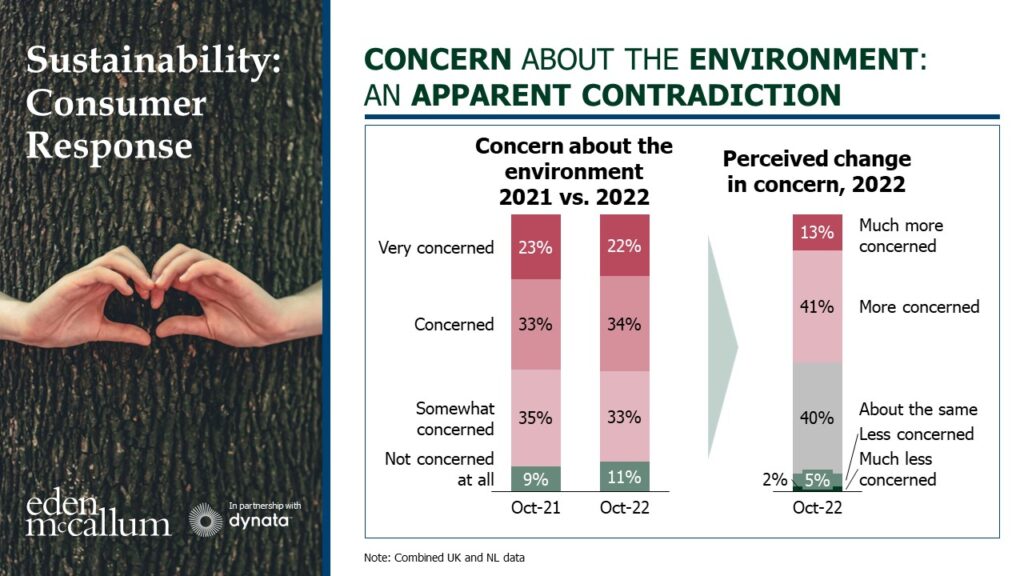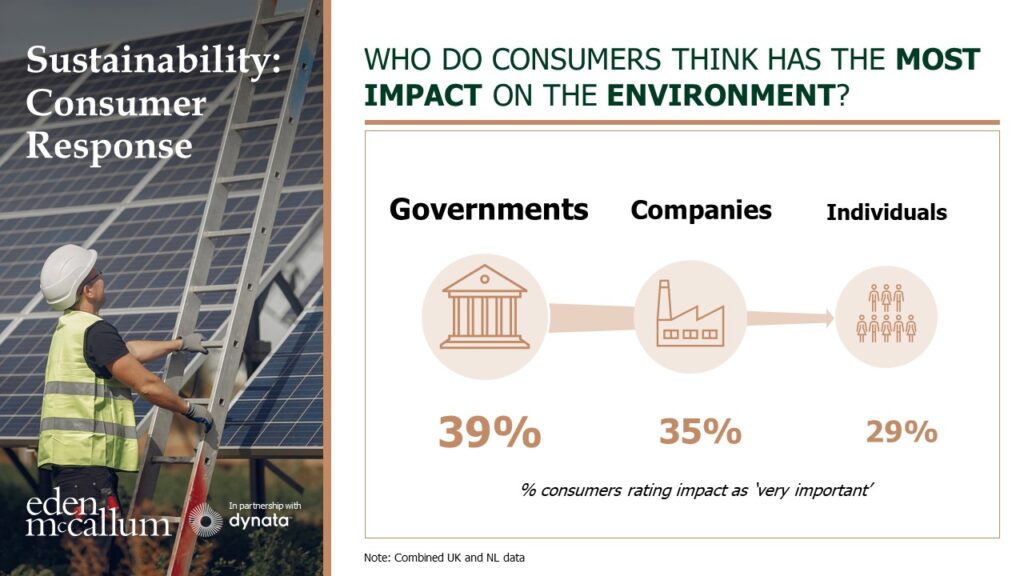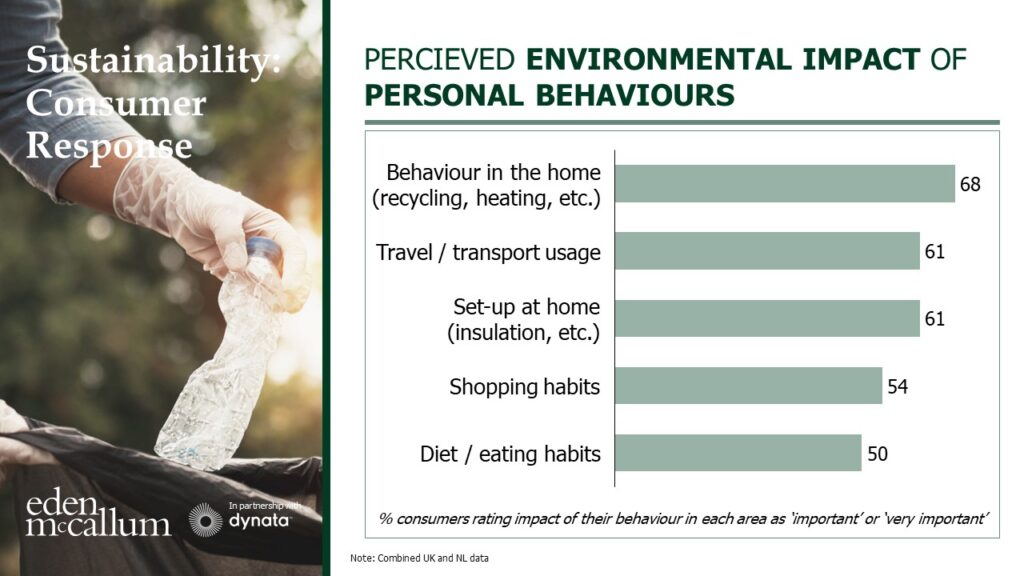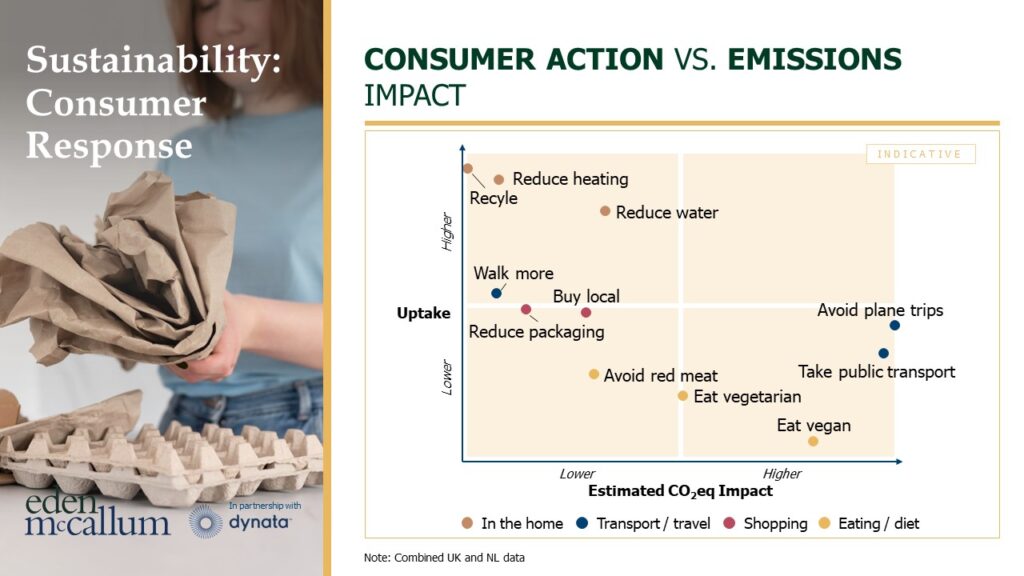Consumer Sustainability Survey
November 2022
Few now seriously question that man-made climate change is real, or that action is required to ensure the sustainability of life on the planet. Yet there remains a “thinking-doing” gap: most people recognise that their behaviour has to change to deal with this problem. But that behaviour is not necessarily changing fast enough, nor is it necessarily focused on the right actions.
This is a key finding from the latest Eden McCallum survey of consumers in the UK and the Netherlands on attitudes to environmental sustainability. Nearly 3,000 people in each region were asked for their perspectives on sustainability, and how their actions may have been influenced by these attitudes. Awareness levels of the relevant issues are high. But old habits die hard.
For example, levels of concern about the environment are high across all age groups, with only around 10% saying they are “not concerned at all”. But while these figures have barely moved since a year ago when Eden McCallum asked the same question, when asked now if they are more concerned than one or two years ago, half the respondents agreed. Respondents feel as though they are more concerned, even though the absolute level of concern they report hasn’t in fact changed.

Respondents believe the power to act lies primarily with larger institutions: while individuals are seen as very important by about 3 in 10, governments (or regulators) and businesses are seen as having more influence. Out of all business sectors, respondents find it most important for food and grocery companies to show a strong commitment to sustainability, closely followed by the fashion industry.

When it comes to their personal behaviour, respondents view their activities in the home as having the greatest environmental impact – more so than their shopping or eating habits, for example.
In the home, recycling and reducing energy usage are the most common actions people are taking: over 50% say they frequently recycle, with a similar proportion exercising care in their use of heating. However, careful use of energy in the home is being driven more by concern about costs than the environment.
As far as the use of transport is concerned, in the UK, about half of respondents say they always or often walk instead of using a car, bus, or train. In the Netherlands, about a quarter always avoid trips that require planes, and well over half opt to cycle rather than use a car or public transport.

Many consumers recognise that their choices have consequences. When shopping, over 40% of respondents regularly try to buy fewer new products, and about a third regularly buy at local or independent shops. When eating, about a quarter of respondents try to avoid specific damaging ingredients and avoid red meat.
Generally, older respondents attach less importance to the impact of their actions in all areas tested (e.g., at home, shopping, eating, travel, etc). Older respondents are more likely to be taking “sustainable” actions in the home; but with diet and shopping, it is younger respondents who are more likely to make sustainable choices.

The most startling finding is perhaps this: the climate change mitigation options with the highest positive impact – going organic, eating less (red) meat, avoiding planes – have the lowest levels of uptake. Here is an echo of the paradox noted earlier: while people may feel they are more worried about climate change, in fact, their actions suggest that this concern is not yet overwhelming nor causing them to act differently where it matters most.
Sara Ghazi-Tabatabai, Partner at Eden McCallum, says this lag between awareness of the problem and the decision to act differently represents a challenge to policymakers, business leaders and campaigners. “It is clear from the data that most consumers understand what is at stake,” she says. “The majority believe government and companies can have the most impact, and many seem unready to commit to adopting new behaviours. Business leaders may want to innovate and offer new, more sustainable options – but they must demonstrate a commitment to change themselves, and not just expect it from their customers.”
To view the full results, please click here for the UK and click here for the Netherlands.
Follow us on LinkedIn to remain updated.

